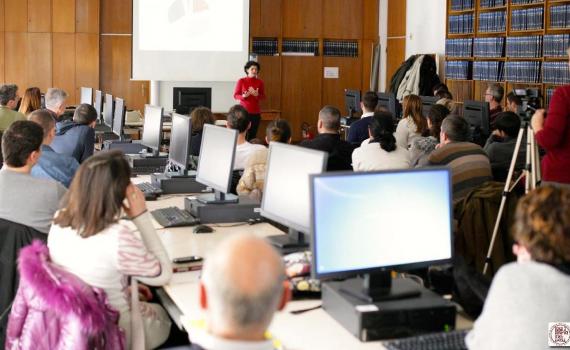
overview
EIFL has been supporting open access (OA) and open access publishing in Serbia since 2000. As a result, Serbia was one of the first countries in eastern Europe to adopt an open access publishing model.
EIFL’s main partner has been the Serbian Library Consortium for Coordinated Acquisition (KoBSON). Our early work included supporting national and institutional open access awareness raising and advocacy workshops. This resulted in the launch of an open access journals portal at the National Library in 2005.
Most Serbian open access journals are publicly-funded and do not levy Article Processing Charges (APCs - publication fees that journals sometimes charge authors or their institutions to make a work available in OA). In 2011, after the international economic crisis of 2008 and withdrawal of some government funding for journals, EIFL supported a project that included research into whether Serbian open access journals could switch to an APC business model. The research found that an APC business model for journal publishing would not be viable because it was not affordable.
In 2016, there were about 400 journals in Serbia that were freely available online. However, the transition to e-publishing had not yet been completed. Serbian open access journals were basically traditional print journals with online versions. Some were not fully aware of their open access status, and most did not have explicitly defined journal or open access policies.
The implications of this situation became clear when Serbian journals reapplied for entry into the Directory of Open Access Journals (DOAJ). About 30 journals were removed from the DOAJ because they did not comply with standards set by DOAJ.
From April 2016 to January 2017, KoBSON led an EIFL-funded project, ‘Revisiting OA Journal Policies and Practices in Serbia’, addressing these issues.
This project had far-reaching results and impact. EIFL is now building on achievements in Serbia to further improve open access publishing within the scope of the DIAMAS (Developing Institutional Open Access Publishing Models to Advance Scholarly Communication) project.
ACTIVITIES
- Upgrading Serbian open access publishing infrastructure, specifically doiSerbia (a digital object identifier repository that contains articles from the leading Serbian scientific journals).
- A comprehensive study into 236 Serbian open access journals, analysing their profiles, publication ethics, open access policies and practices, editorial processes and visibility in international journal databases.
- Developing policy templates and good practice recommendations for Serbian open access publishers. The templates cover editorial processes and publication ethics, open access policy, copyright and licensing.
- Developing training materials for journal editors open access publishing, optimizing open access journals websites and setting up OJS.
- Organizing workshops on developing and improving editorial practices, journal websites and use of the open access journal publishing software, Open Journals System (OJS).
- Helpdesk consultations, including face-to-face meetings and email exchanges.
- Advocating for the national open science policy (Open Science Platform 2.0) to include support for Diamond open access publishing.
TIMELINE
2000 - Ongoing
ACHIEVEMENTS
Serbian open access journals are more visible:
- More open access journals meet best practices for open access publishing standards set by international aggregators.
- Over 100 journals developed policies, based on templates produced, and improved their editorial and publishing processes.
- DOAJ now includes over 210 Serbian open access journals.
National and institutional open access publishing infrastructure in Serbia has improved:
- DoiSerbia, Serbian Citation Index and individual journal websites were upgraded to accommodate journal policies. Thanks to this, information about journals’ open access status, licensing and policies are more transparent and easy to find.
- Increasing numbers of journals have set up journal publishing platforms using OJS.
The knowledge-base for open access publishing in Serbia has improved:
- Open access journal publishers in Serbia have access to a comprehensive range of online resources, available on a website. The website (in Serbian) incorporates all the publishing and policy guidelines and templates created during the project, as well as workshop presentations.
- There is now a strong community of open access publishers in Serbia who support each other.
- KoBSON continues to respond to requests for support and training from open access journal publishers and editors.
- In 2025, the National Diamond Capacity Hub was established. The hub will serve as a national node within the European Diamond Capacity Hub (EDCH). It will provide support to Diamond OA publishers, enhance cohesion and synergy among fragmented initiatives, and promote alignment with the Diamond Open Access Standard. The hub is coordinated by KoBSON.
FIND OUT MORE
- More about EIFL’s support for OA in Serbia.
- Article ‘Defining the Editorial Policies of Open Access Journals in Serbia and the Role of Librarians in This Process’ by Milica Ševkušić of the Institute of Technical Sciences of the Serbian Academy of Sciences and Arts (2017).
- ‘Serbia: Milestones on the road to open science’, blog by Milica Ševkušić, librarian at the Institute of Technical Sciences of the Serbian Academy of Sciences and Arts and EIFL Open Access Coordinator in Serbia. Published on the EIFL website in celebration of the 20th Anniversary of the EIFL Open Access Programme in 2023.





